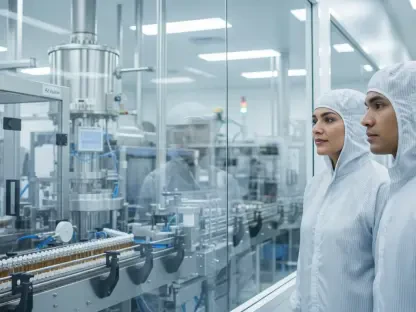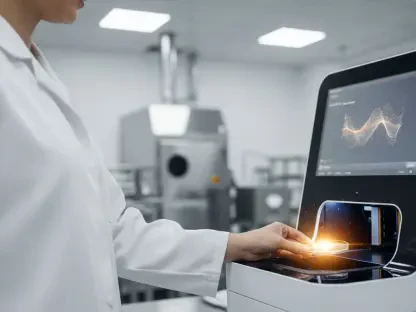The biopharmaceutical sector has witnessed significant changes in leadership roles within major Contract Development and Manufacturing Organizations (CDMOs), driving strategic growth and development. The appointment of seasoned leaders plays a crucial role in strengthening the research, development, and operational strategies of these companies, enabling them to maintain a competitive edge in an ever-evolving landscape.
Veranova’s Strategic Appointment
New Global Vice President of Analytical Research Development Operations
Veranova, based in Massachusetts, has made a pivotal appointment by naming Scott Zugel as the Global Vice President of Analytical Research Development Operations. Zugel, an industry stalwart with more than twenty years of experience, brings valuable expertise to the role. Prior to this, he led analytical development at Takeda, where he was instrumental in establishing their first internal metrology team for analytical testing laboratories. Additionally, Zugel has a distinguished career at Pfizer global R&D, advancing to the position of laboratory leader. Veranova’s Chief Technology Officer, Rohtash Kumar, expressed high expectations for Zugel’s contributions, emphasizing his impressive track record and alignment with the company’s research and development strategies.
Facility Expansion and Capability Enhancement
Alongside this key appointment, Veranova has made significant strides in expanding its facilities to bolster production capabilities. In July of the current year, the company invested $30 million into its Devens facility, significantly enhancing its antibody drug conjugate (ADC) capacity. The expansion included the development of a state-of-the-art process laboratory and two potent compound cGMP suites. This investment underscores Veranova’s commitment to advancing complex therapeutic production processes and ensuring they remain at the forefront of innovative drug development. Such strategic moves are designed to support the growing demand for ADCs and other potent compounds, which require specialized manufacturing environments.
Leadership Transition at ProBioGen
CEO Appointment
ProBioGen has undergone a notable leadership change, appointing Alfred Merz as CEO. Merz previously held positions as Chief Operating Officer and interim CEO and boasts an extensive background that spans key roles at Bayer and Novartis. His career began in 1995 as a plant manager at Novartis, progressing to Senior Vice President and head of product supply medical devices at Bayer. ProBioGen’s chairman, Wafik Bardissi, has commended Merz’s profound leadership skills and strategic acumen, recognizing these traits as vital for steering ProBioGen toward continued growth and operational success.
Operational and Strategic Focus
Merz’s elevation to CEO is expected to have a substantial influence on ProBioGen’s strategic and operational direction. His wealth of experience and proven track record make him well-equipped to drive the company towards new heights of excellence. Merz’s leadership philosophy is firmly rooted in aligning ProBioGen’s operational practices with long-term strategic objectives, ensuring the company can adapt to the dynamic demands of the biopharmaceutical industry. Under his guidance, ProBioGen is anticipated to adopt innovative approaches and enhanced operational efficiencies aimed at maintaining robust growth trajectories.
Kincell Bio’s Operational Leadership
New Chief Operating Officer
Larry Pitcher has been appointed Chief Operating Officer at Kincell Bio, marking another significant shift in leadership within the sector. Pitcher is known for his substantial expertise, having held senior roles at Catalent, RTI Surgical, and Thermo Fisher. His tenure as Vice President and General Manager for Catalent’s operations in Maryland has equipped him with invaluable insights into large-scale manufacturing processes and operational management. Kincell Bio’s CEO, Mark Bamforth, highlighted Pitcher’s arrival as timely, considering the company’s preparations for critical clinical studies and imminent product launches at key sites in North Carolina and Florida. This appointment is poised to strengthen Kincell Bio’s operational framework and accelerate its strategic initiatives.
Expansion and Acquisition Initiatives
Kincell Bio has made noteworthy advancements in scaling its operations, reflecting a robust growth strategy. The company emerged from stealth mode in August of the previous year, securing $36 million in funding to support its expansion efforts. Another strategic move included the acquisition of Imugene’s North Carolina facility for approximately $6 million, which represents a significant step in broadening Kincell Bio’s manufacturing capabilities. These efforts are indicative of the company’s commitment to scaling efficiently and aligning its operations with projected clinical trials and product launches. Such expansion initiatives are vital for positioning Kincell Bio as a competitive player in the biopharmaceutical landscape.
eXmoor Pharma’s Scaling Operations
New Non-Executive Director Appointment
In a strategic move to enhance its operational capabilities, eXmoor Pharma has appointed James Miskin as Non-Executive Director. Miskin’s extensive experience, spanning over two decades at Oxford Biomedica, is particularly noteworthy for his contributions to the development and delivery of Novartis’s CAR-T cell therapy, Kymriah. His appointment is expected to provide valuable support to eXmoor Pharma’s senior team as the company scales its operations and enhances client support. Miskin’s proven expertise in clinical and commercial manufacturing makes him a pivotal addition to eXmoor Pharma’s leadership team, and his insights are anticipated to drive significant advancements in the company’s manufacturing protocols.
Facility Authorization and Strategic Partnerships
Further exemplifying its commitment to expansion, eXmoor Pharma has inaugurated a new 65,000 square-foot facility in Bristol, UK. This facility launch, coupled with $35 million in funding secured earlier in May, signifies the company’s aggressive growth strategy. Additionally, eXmoor Pharma received a manufacturing and import authorization from the UK’s MHRA in August, marking a critical milestone in its operational capabilities. The company’s partnership with Quell Therapeutics is also noteworthy, as they collaborate to manufacture CAR-Treg product therapies. These strategic investments and collaborations illustrate eXmoor Pharma’s dedication to enhancing its manufacturing infrastructure and fostering innovative therapeutic solutions.
Conclusion
The biopharmaceutical sector has recently seen notable transformations in leadership roles among major Contract Development and Manufacturing Organizations (CDMOs). These shifts have been pivotal for driving the strategic growth and development of these companies. Appointing experienced leaders is vital for fortifying their research, development, and operational strategies. This enables these organizations to sustain a competitive edge in an ever-changing industry landscape. Veteran leaders bring a wealth of knowledge and innovative approaches that are instrumental in navigating the complexities of the biopharmaceutical market. Their expertise not only helps in advancing current projects but also in identifying new opportunities for expansion and improvement. As the sector continues to evolve rapidly, the role of adept leadership becomes increasingly significant in ensuring the companies can adapt and thrive. Therefore, these leadership changes are not just routine but are integral to the ongoing success and competitiveness of CDMOs in the global biopharmaceutical arena.









